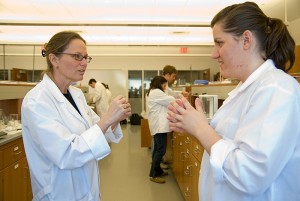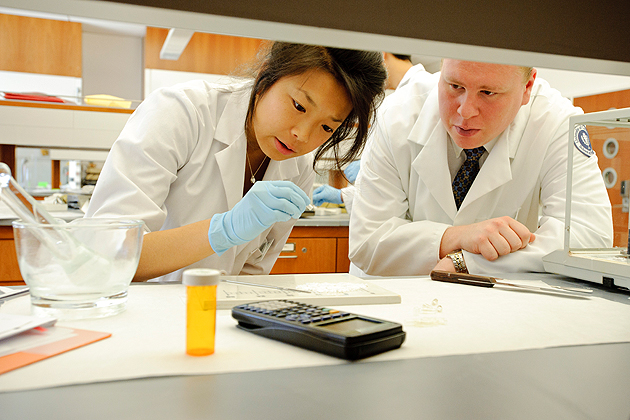Top researchers in pharmaceutical science and engineering at the UConn School of Pharmacy are working with the U.S. Food and Drug Administration to improve drug manufacturing standards in the United States.

UConn is one of 10 member universities that make up the non-profit National Institute for Pharmaceutical Technology and Education (NIPTE). The academic organization recently entered into a cooperative agreement with the FDA to conduct advanced research that is intended to improve drug safety, reduce health care costs, and create jobs. As part of the agreement, universities in the consortium will receive cooperative research grants totaling up to $35 million over the next five years.
“Our research scientists at the University of Connecticut School of Pharmacy and those at other NIPTE institutions are eager to contribute their knowledge and expertise in helping to advance science and develop new models for the manufacture, delivery, and formulation of not only drugs but biological products and medical devices as well,” said Robert McCarthy, dean of the UConn School of Pharmacy and chairman of the NIPTE Board of Directors. “It is our hope that this effort will bring important new products to the pharmaceutical marketplace more quickly, while ensuring they are safe and of the highest quality.”
The research funding comes at a time when the current cost of bringing a drug to market in the U.S. exceeds $1 billion, and an increasing number of drugs and drug ingredients are being imported from abroad. Investment in the research of drug development and manufacturing is expected to improve America’s manufacturing competitiveness and create high-paying jobs. It is also expected to help reverse current outsourcing trends in the pharmaceutical industry by decreasing the cost of manufacture and improving the quality and safety of drugs.
“Over the last several years, NIPTE has contributed a great deal of research toward our understanding of quality pharmaceutical manufacturing,” said Helen Winkle, director of the FDA’s Office of Pharmaceutical Science. “Progress in this area will mean safer, more efficient, and less costly drug production here in the US, and we are looking forward to NIPTE’s findings.”

The UConn School of Pharmacy is currently one of the few academic institutions in the nation with a strong emphasis in pharmaceutical technology and manufacturing science. The School is a major contributor to NIPTE programs. UConn’s prowess in the field and the importance of pharmaceutical technology to industry is reflected by UConn’s Pfizer Distinguished Endowed Chair in Pharmaceutical Technology, an endowment from the world’s largest research-based biomedical and pharmaceutical company, Pfizer Inc.
Besides the University of Connecticut, the other NIPTE member institutions are Duquesne University, Illinois Institute of Technology, Purdue University, Rutgers University, University of Puerto Rico, University of Iowa, University of Kentucky, University of Maryland–Baltimore, and the University of Minnesota. Research conducted by NIPTE faculty is collaborative by design, to provide for coordinated publication of the cutting-edge research results.
NIPTE Inc. is dedicated to fundamental research and education in pharmaceutical product development and manufacturing. The organization’s goal is to increase science and engineering-based understanding of this area so that novel state-of- the-art technologies can be developed, and science-based regulations implemented. These technologies will also enable new drug discoveries to be brought to market faster with less variability, higher predictability of performance, and at a significantly lower cost.
“Outsourcing of drugs and drug intermediates are increasing at an alarming rate, potentially threatening overall quality of our drugs accompanied by huge job losses in this country,” said Prabir Basu, executive director of NIPTE. “Development and manufacturing costs can be reduced, quality of our drugs can be improved, and outsourcing trends can be reversed by developing science-based standards for drug development and manufacturing.”
The FDA grant will support programs to rectify these drug development and manufacturing problems by creating ways to reduce time to market, improving small-batch production, promoting continuous manufacturing, saving money or energy, or reducing environmental impact from the manufacturing of products.
UConn pharmacy professor Michael Pikal – who holds the Pfizer Chair – and Robin Bogner, an associate professor, have played an integral role in NIPTE’s work as both researchers and committee members. Pikal and Bogner were part of a research team whose work was recently funded by grants from the FDA to NIPTE. In 2008, Pikal led a team that discovered a way to make a specialized clotting component used to treat bleeding disorders. The technology was patented.

Bogner recently patented a novel apparatus that allows manufacturers to study the hydrodynamics of drugs as they dissolve in solution under a microscope – a process that is faster and uses less product than existing methods. Testing drug dissolution can be a lengthy and costly process for manufacturers that delays bringing important new drugs to market.
“NIPTE facilitates the collaboration of experts in complementary areas of research to form powerful teams that address challenges to pharmaceutical product quality,” says Bogner. “I have learned so much from the NIPTE teams on which I have worked, allowing my own research program to make remarkable progress. Working with the FDA scientists helps the NIPTE faculty to focus our research on issues that will impact public health.”
Other potential research areas covered by the FDA grant include:
- Creating simulation models for new drug manufacturing techniques;
- Developing advanced methodologies for quality control;
- Creating new models for drug delivery such as dry product inhalers, transdermal patches, and liposomal products;
- Development of specialized manufacturing techniques suitable for products administered in low dosages and for products with high toxicity or narrow therapeutic ranges; and
- Development of models for the manufacturing and engineering of medical and biological products such as infusion pumps, prosthetic organs, defibrillators, and tissue engineering devices.



